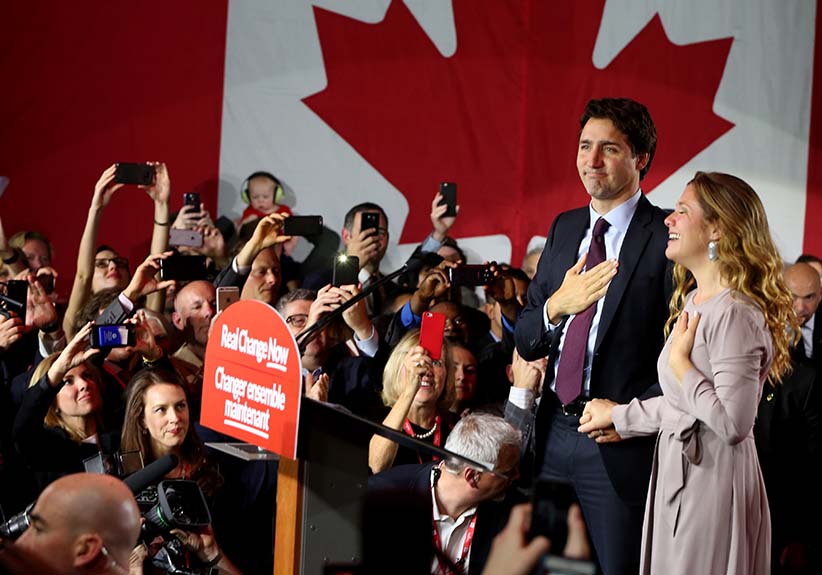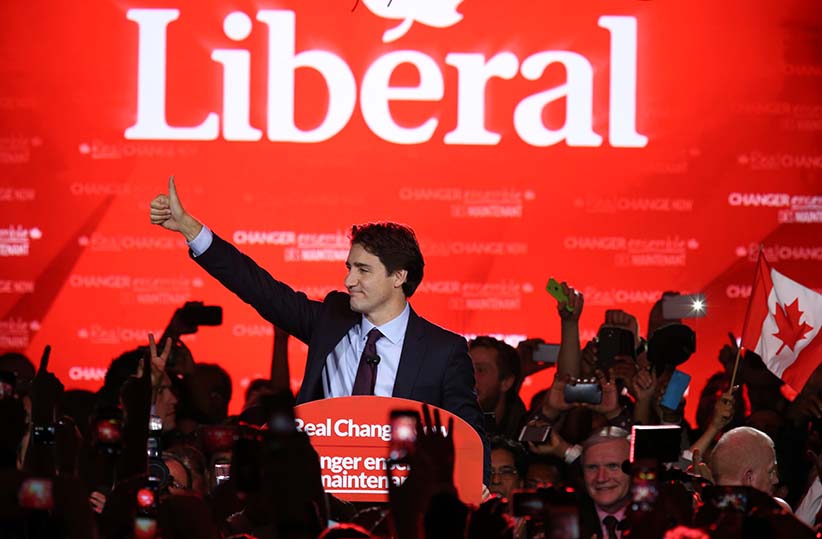How the Liberals took down the Tories
Canada’s 42nd election was a triumph on a scale no sensible pundit or pollster could have predicted
Liberal Party leader Justin Trudeau is accompanied by his wife Sophie Gregoire as he arrives to give his victory speech after Canada’s federal election in Montreal, Quebec, October 19, 2015. (Christinne Muschi/Reuters)
Share

Nothing like this was supposed to be in the campaign cards. Touted from the outset as the closest race ever among the three main federal parties, an up-for-grabs contest bound to result in a minority government, Canada’s 42nd general election turned into a Liberal triumph on a scale no sensible pollster or pundit would have dared predict. Justin Trudeau will now become Canada’s 23rd prime minister, leading an unexpected majority government.
For Stephen Harper, all hope vanished on the battleground where he secured his surprise 2011 Conservative majority—and where Tory strategists had banked on him again dominating in 2015—the great massing of 55 ridings in and, especially, around Toronto. And so the driving force behind the deal to unite the fractured Canadian right in 2003 leaves the Tory leadership after nearly a decade as Prime Minister.
As election results rolled in from east to west, sizeable Liberal gains that had been widely predicted on the East Coast turned into an outright sweep, as the party won all 32 Atlantic province ridings. It was a harbinger. In Quebec, the Liberals made strides beyond any mainstream forecast. But only when the votes were tallied in Toronto, and its surrounding suburbs, was it finally undeniable that Tory losses would be much too severe, and Liberal victories far too abundant, for Harper to imagine clinging to power.
It was left to voters across the Prairies and British Columbia to convert what was already at least a solid Liberal minority win into a resounding majority. Justin Trudeau will become prime minister, as his father Pierre Trudeau was before him, with Liberal MPs occupying, according to the count in the early morning hours, at least 184 of the 338 seats in the newly expanded House of Commons.
It was in Toronto, way back on Aug. 4, that Harper announced his first key promise of the campaign: a 15 per cent tax credit on home renovations between $1,000 and $5,000. He did it at a tile store in Eglinton–Lawrence, the riding held by Joe Oliver, his finance minister. Eleven weeks later, Oliver was unseated by a Liberal, along with a raft of other Toronto-area Tory and NDP incumbents, and nobody remembered that reno tax break.
Yet offering homeowners money for fixing up their houses looked, at first, like a classic Harper-era Conservative gambit. A succinct policy message, easily understood, aimed at the self-interested heart of the voting middle-class. In 2015, though, with about 60 per cent of Canadians telling pollsters they were hungering for change, the familiar Tory reliance on niche pocketbook policy offerings utterly failed to work its old magic.

Even less fruitful was Harper’s mid-campaign bid to shift the debate to identity issues, especially his government’s polarizing policies on banning the niqab from citizenship ceremonies and stripping the Canadian citizenship of dual nationals convicted of terrorism.
Trudeau stoutly opposed Harper on both these values-laden issues. The popular verdict? A poll late in the campaign by Abacus Data for Maclean’s found that those voters most concerned about their government’s values were more than twice as likely to support the Liberals as the Tories.
More broadly, however, Trudeau ran on the catch-all slogan “Real change now.” After nearly a decade of the Harper government, voters evidently liked the sound of that. Voters knocked the Michael Ignatieff-led Grits down to a humiliating third place in 2011; they lifted Trudeau’s overhauled Liberals back to the party’s accustomed 20th-century position of dominance.
Reduced to about 102 MPs, the Conservatives now enter a difficult rebuilding phase, without Harper. Although he didn’t mention his resignation in his election-night speech, his party announced that a leadership contest is on the way. NDP Leader Tom Mulcair, who started the campaign with the polling lead, and perhaps ran too cautiously to hold it, saw his party relegated, with only about 42 MPs, to its traditional position trailing the Liberals and Tories.
In his first national campaign as leader, Trudeau’s performance was almost impossible to fault. He ran on a carefully calibrated Liberal platform, which promised a middle-income tax break (offset by a hike on earnings over $200,000); bigger federal support cheques to most parents; and three years of deficit spending to inject vigour into a listless economy.
His assertive, expectation-exceeding performances through five televised debates—starting Aug. 6 at one hosted by Maclean’s in Toronto—made the tag line from the Tory attack ads—“Justin Trudeau is just not ready”—ring hollow.
His rallies rocked. His stump speech delivery steadily improved. His athletic good looks made him appear even younger than his 43 years. At six foot two, he often gave the impression he was floating just above the adoring throngs, providing the Liberal machine with a steady stream of compelling footage from the hustings to edit into YouTube videos and TV ads. But no image will be as indelible as the one he created while delivering his victory speech in Montreal.
“Canadians chose change—real change,” he told an ecstatic partisan crowd, his voice finally grown hoarse after 78 days of tireless campaigning. “This is what positive politics can do. This is what a positive, hopeful vision and a platform and a team can make happen.”
In Calgary, his adopted hometown, Harper had to hope his concession speech would begin to dispel the bad odour of late-campaign desperation ploys, especially his appearances at two Toronto campaign events with Rob Ford, the city’s internationally ridiculed former mayor.
“The people of Canada have elected a Liberal government, a result that we accept without hesitation,” he said. But Harper also spoke of his pride in the Conservative policy record, especially on the economy and foreign affairs. And, perhaps alluding to the more controversial parts of his campaign, he declared: “We gave everything we have to give and we have no regrets whatsoever.”
For Harper, federal politics has come full circle in a way that must feel almost cruelly ironic. He has written forcefully in the past about being first drawn as a young man to Conservative politics by anger over the policies—especially the National Energy Program—and political style of Pierre Trudeau, Justin’s father.
Mulcair didn’t lapse in the campaign’s late stages into the sort of dubious tactics Harper tried. Still, Trudeau’s relentless rise must have tested the famously intense NDP leader’s composure. His party led in the polls from Aug. 2, when Harper visited the Governor General at Rideau Hall to officially start the campaign, until Sept. 21, when the Liberals passed the NDP for good.
The real watershed in that contest arguably came between Aug. 25, when Mulcair promised that as prime minister he would balance the books, and Aug. 27, when Trudeau declared that he would run three years of deficits. That gamble paid off by allowing the Liberals to differentiate themselves to progressive voters as more willing than New Democrats to spend to usher in change.
In his concession speech in Montreal, Mulciar said Trudeau “made ambitious commitments to Canadians, and Canadians will have high expectations for the next Parliament.” Despite the NDP falling far back from the high-water mark it set in 2011 under the late Jack Layton, Mulcair cast the election as a sort of moral victory. “Canadians have turned the page,” he said, “on 10 long years, and have rejected the politics of fear and division.”
Beyond the decisive swing in Ontario, where the Liberals won a commanding 79 of 121 seats, the political map changed dramatically across the country. In Quebec, the Liberals won 48 of 78 ridings. In Manitoba and Saskatchewan, they took nine, up from just two in 2011, of 28 seats in the two provinces. Trudeau will even have two MPs from Alberta, the Tory heartland, up from zilch. In B.C., Liberals took 17 of 42 seats. (All these totals were from Elections Canada around midnight, when they were still shifting slightly.)
Many major figures from the Tory and NDP ranks lost their seats. Bad news set in for the NDP when the party’s popular deputy leader, Megan Leslie, was defeated in Halifax. In Ontario, along with Joe Oliver falling, Chris Alexander, Harper’s hard-hitting citizenship minister, was beaten by Mark Holland, the Liberal he had ousted in 2011. As for the Liberals, among the many winners are only a few cabinet stalwarts of the old Jean Chretien and Paul Martin governments, but veteran John McCallum was re-elected near Toronto, along with Ralph Goodale in Saskatchewan.
[widgets_on_pages id=”Election”]
A thorough changing of the guard is now in order in official Ottawa. Trudeau decided to enter politics in 2006 after he backed Toronto Liberal Gerard Kennedy’s failed bid for the party’s leadership. Among Trudeau’s top strategists are veterans of Kennedy’s team, experienced in Ontario provincial politics, but still quite young, notably Gerald Butts, 44, his ever-present best friend and top adviser, and Katie Telford, 37, his campaign chief. He thanked them both in his victory speech.
Exactly when Trudeau will reconvene the House is not yet clear. But he has said his first order of business will be to pass a bill to cut the tax rate on incomes of between $44,700 and $89,401, for a saving at tax time of up to $670.
One of his biggest promises hasn’t really received much attention: Trudeau vows to convene an all-party committee to review new ways of electing MPs, such as ranked ballots, on which voters would list their picks in order of preference, and proportional representation, which would guarantee parties a share of seats closer to their share of the popular vote.
Trudeau pledged that within 18 months, his government will get rid of the familiar “first past the post” system, in which all that matters is which candidate earns the most votes in each riding, and enact some sort of reform.
In other words, he vows that the very democratic mechanism that gave him his victory tonight, and handed Harper such a terrible defeat, will be no more. If he makes good on that promise, whatever else the election of 2015 was, it will go down, for Canadian voters, as the last of its kind.